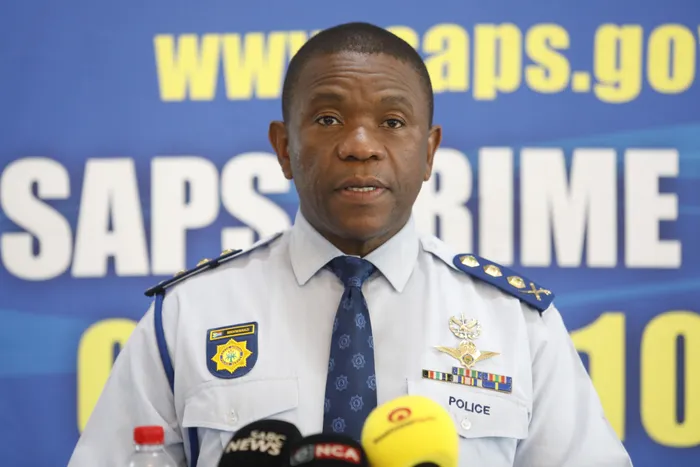
Parliament’s legal advisor Andile Tetyana says no formal inquiry is needed to probe key allegations made by Lt-Gen Mkhwanazi, parliament can act using its existing oversight powers.
Image: Doctor Ngcobo / Independent Newspapers
Parliament does not need a formal inquiry to investigate some of the allegations made by KwaZulu-Natal police commissioner, Lieutenant-General Nhlanhla Mkhwanazi, says Parliament’s legal advisor, Andile Tetyana.
Speaking to members of the Portfolio Committees on Police and Justice and Constitutional Development on Wednesday, Tetyana said the aim should be to thoroughly investigate the allegations raised by Mkhwanazi during his July 6, 2025, press briefing, particularly to improve governance and policing within the SAPS.
“What is the end game? Where do we want to find ourselves, and where do we want to end? And in my view, the end game is to get to the bottom of the allegations made by General Mkhwanazi on the 6th of July 2025 in order to improve policing and governance within the South African Police Service,” Tetyana said.
He explained that oversight is a constitutionally mandated function of Parliament, citing Section 199(8) of the Constitution, which obligates multi-party parliamentary committees to oversee all security services in line with national legislation or parliamentary rules.
He stressed that, while the doctrine of separation of powers limits Parliament from directly investigating or prosecuting, it still has the power and obligation to scrutinise and question the executive.
“Parliament’s control over the executive means influence, not direct power. It means advice, not command. It means criticism, not obstruction. It means scrutiny, not initiation. And it means publicity, not secrecy,” said Tetyana.
Tetyana and his colleague Zingisa Zenani provided legal guidance on how Parliament can navigate the issues raised in the media briefing without launching a full-scale formal inquiry.
According to them, there are several “low-hanging fruit” issues that committees can address immediately using existing powers under parliamentary rules.
“These are some of the issues which we refer to as the low-hanging fruit, which we feel even a committee of Parliament with all its powers can be able to call the member of the Executive responsible for police and, of course, get clarity from him as to what is happening in relation to these matters,” he said.
''One of which is the issue of the status of the political killings task team. You will recall that General Mkhwanazi told the nation that there was a letter from police minister Mchunu which had directives about closing the task team itself. General Mkhwanazi told us that given the fact that the instruction did not come from the national commissioner,General Fannie Masemola, the work of that task team is still continuing.''
Among the issues raised by Mkhwanazi that Parliament can probe are the political killings task team, the 121 case dockets allegedly removed by the police minister, the status of crime intelligence leadership posts, and the delineation of responsibilities between SAPS and the Independent Police Investigative Directorate (IPID).
“We do not require a formal enquiry in order for those issues to be addressed,” said Tetyana.
For example, he said Parliament can ask about the current status of the political killings task team and the 121 dockets taken from it.
“All I am trying to demonstrate is that for parliament to ask what the status of these 121 dockets. I don’t think this requires a formal enquiry,” he added.
T
etyana also said there is nothing preventing Parliament from questioning the conduct of Police Minister Senzo Mchunu, who is currently on special leave.
“Minister Mchunu is not clothed with legal immunity by virtue of him being on special leave. We know for a fact that he will be a material witness in the work of the Commission and should criminal conduct be found on his part, he will be charged and prosecuted,” he said.
He referenced a meeting on March 5 where Mchunu allegedly claimed not to know a Mr Brown Mogotsi, later referring to him as his “comrade.”
According to Tetyana, this discrepancy is the kind of issue that Parliament can deal with through the Joint Ethics Committee or Powers and Privileges Committee without needing a formal inquiry.
Tetyana also outlined three possible approaches Parliament could take going forward: support the judicial commission of inquiry already established by the President and led by Justice Mbuyiseli Madlanga, establish a new ad-hoc committee under Rule 253, or have the existing committees work jointly in terms of Rule 169.
Regarding the possibility of a full-blown inquiry or the formation of an ad-hoc committee, Tetyana explained the options available to Parliament.
“Parliament can choose the route of having a full-blown inquiry, which can take the shape of the
Judicial Commission of Inquiry appointed by the President,” he said.
“But there are disadvantages, one being that we would not want to duplicate the work which another commission is already doing.”
He also spoke about the ad-hoc committee option. “An ad-hoc committee may be established for a specific task and, once concluded, must be terminated. While it is seized with the task, the committees normally responsible for oversight over these matters would be commuted of that responsibility,” he said.
While acknowledging public scepticism about commissions of inquiry, he defended the current judicial commission as independent and not executive-led.
He reminded members that while commissions and inquiries are valuable, they depend on political will to implement their findings. “Even the work of the commission will amount to nothing if there is no will to implement whatever recommendations.”
hope.ntanzi@iol.co.za
IOL Politics
Related Topics: